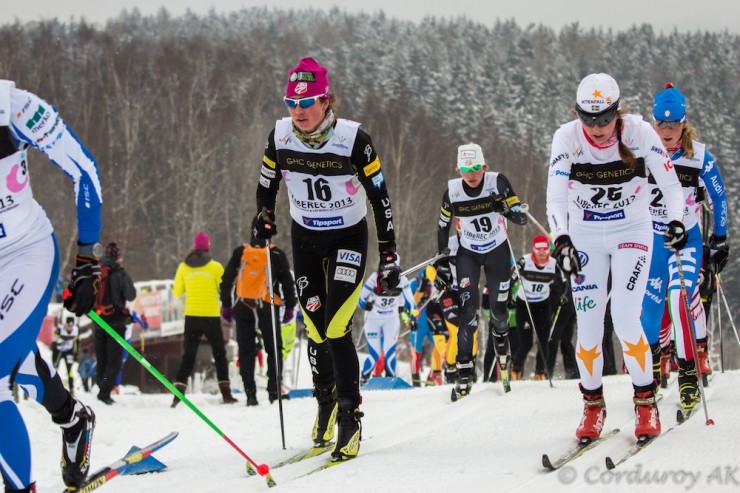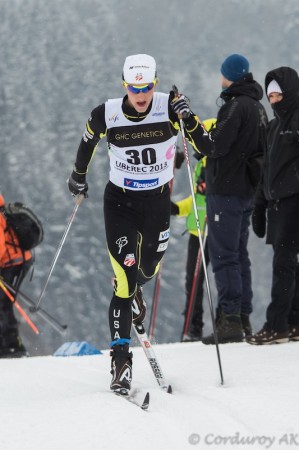
After the Junior and U23 World Championships wrapped up two weeks ago in Liberec, Czech Republic, a handful of American athletes and coaches remained in Europe to compete in a series of Scandinavian Cups in Madona, Latvia, and Pärnu, Estonia, where they were joined by a few older seniors from the U.S. Together they form a team of seeking to soak up international racing experience, for though each race is the Scandinavian equivalent of a SuperTour, the field contains a talented group of sub-World Cup Norwegian, Swedish and Finnish skiers.
“My primary goal of this trip is simply to soak up the European racing experience,” said Caitlin Patterson (Craftsbury Green Racing Project), who has led the U.S. in results so far this week. “These races are the first time I’ve raced in Europe apart from the World Junior/U23 Championships, so it’s really been about expanding the range of race types and locations I’ve experienced.”
In Madona Patterson was the top American performer in both the classic distance race and mass-start freestyle event. Thursday’s 10 k skate was a particular highlight for her, as it was one of her best mass starts all year.
“It was probably one of the best mass starts I’ve ever had, judging by how well I maneuvered around people and got towards the front immediately,” she said. “I was never in the very front, but I was within the top five a few times on the first lap of two.”
In a lead pack of ten women that separated within the first 3 k, Patterson was pleased to find herself among them.
“I remember noticing during the race that I was the only non-Norwegian among that group! It was very fun to be able to ski with the Norwegians, to match them stride-for-stride and try to keep up with their surges over the tops of the hills,” she said.
After skiing with Finand’s Marjaana Pitkaenen during the second lap Patterson finished just shy of three other women, and crossed the line 46 seconds behind race-winner Kari Vikhagen Gjeitnes (NOR). Patterson described the race as one of the most enjoyable she’s had lately and hopes that if she can find a touch more speed and energy for the end of future races, “some day soon I’ll be able to keep up with those Norwegians on the podium,” she said.
Though there were only 29 women in the field it was still a competitive two races — Patterson noted that several of the top finishers have scored World Cup points in the past.
“While it certainly isn’t the World Cup, the skiers here are absolutely motivated to race fast and hard, and I’d say based on my experience that the competition is more intense than most if not all races in the U.S.,” she said.
Sophie Caldwell (SMS T2), after fighting off a brief cold at the beginning of the week, finished 14th on Thursday.
“I don’t think today’s race was anything special but it wasn’t a disaster,” she said. “I felt pretty good yesterday but today I got very tired from the fast pace the first lap and then slowed down and settled into a little pack the second lap.”
As one of the seven women named to the American World Championships team last month, Caldwell’s goals for the race series include recovering well in between competitions and getting more accustomed to European racing before she heads to Val di Fiemme, Italy.
“I think racing over here does take some getting used to,” she said. “Sometimes back home, the pace of a longer mass start race can start out fairly relaxed but over here it’s very fast from the start and that isn’t something I’m used to. I’m sure the more we do, the easier and more normal it will seem but both mass starts I’ve done since arriving here (Latvia and U23s) have started out at a very fast pace.”
Three American women competed in the 10 k on Thursday; Becca Rorabaugh (Alaska Pacific University) was 23rd, 1:16 after Caldwell.
Packer Has ‘Breakthrough,’ Notches 16th in 20 k
The men’s 20 k went out much like the women’s — fast — but with about 40 more people in the mix. Through the chaos Eric Packer (SMS T2) had his best race of the season, finishing 16th to lead five U.S. men in the race. At the finish he was only 24 seconds behind Sindre Skar’s (NOR) winning mark.

“Today’s race went really well for me, and was a breakthrough for this season,” Packer said. “I felt comfortable skiing in the group and felt better and better as the race progressed.”
For Packer to be 24 seconds off of Skar, where in Liberec he was minutes off the Norwegian’s pace, was a huge step forward. Packer sat in 30th on the third of four laps and in the remaining kilometers he “put the hammer down” to work his way to the front his group, passing over a dozen skiers along the way. By the end he was catching stragglers from the lead group — no small feat in a field Packer says is “almost as competitive as U23s.”
“Norway is providing World Cup starts to their top three racers this week, and I’m sure Sweden and Finland are placing similar stakes on the races here,” Packer said. “My impression is that all the top Scandinavian athletes not competing on the World Cup are competing in these races.”
Fresh snow fell in Madona nearly every day since the Americans arrived, which made conditions on the course variable in temperatures that hovered around freezing. Packer credited the coaches and his skis with playing a big part in his best race of the year so far.
“The techs did an awesome job on skis,” he said. “Grind was particularly important to day and my 258’s from Caldwell Sport were awesome.”
David Norris (Montana State University) was 28th on Thursday, about a minute behind Packer. After getting sick at U23s in Liberec last month Norris felt closer to normal in Madona but not yet great.
“Today’s race was tough,” he said. “Thirty guys in the lead pack all fighting to move up. The pace was pretty relaxed for 15 k, but when the pace picked up towards the finish I just didn’t have any energy in my legs.
“Today’s race was just decent. I really look towards having a great race.”
Norris, still a junior at MSU, is in Europe for the same reasons the rest of the American contingent is — to gain experience. But he is also in the unique position of still being a college athlete, and when he returns to the States he hopes to qualify for NCAA championships with a good result at regionals.
“I extended my U23s trip so I could get more chances racing in Europe against strong guys,” Norris said. “I asked the coaches this fall if I could make a commitment to getting more race starts in Europe and [MSU head coach] Chad Anderson is just super supportive of anything that may make us better athletes.”
Behind Norris, Jack Novak (Alaska Pacific University) was the third American to finish the 30 k in 39th. Forrest Mahlen (APU) was 51st and Ben Saxton (F.A.S.T. Performance Training) was 57th.
On Thursday evening the team drove from Latvia to Estonia, where a set of Scando Cup sprints are set to take place on February 9 and 10.
Audrey Mangan
Audrey Mangan (@audreymangan) is an Associate Editor at FasterSkier and lives in Colorado. She learned to love skiing at home in Western New York.



